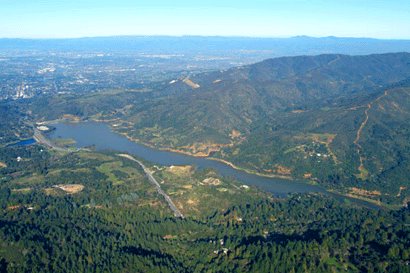
The days are getting shorter now (7:12 AM sunrise, 4:51 PM sunset) and colder too (though nowhere as cold as the Northeast and Midwest). All these make it harder and harder to engage in epic rides. Easy rides just don't cut it. Though they have their pluses: more time to explore, more time to relax over meals, not being so pressed for time, etc., easy rides lack a certain something.
Epic rides are a favorite of mine. To be out there on a long unsupported ride is a curious experience: there is an immense freedom in the endeavor, and yet, a certain apprehensiveness as it means that one has to take whatever comes. Once, for some strange reason, on a really isolated stretch of road, I developed a crippling pain in my tailbone. As a result, I had to stand and pedal for the next 31 miles (49.6 km). Now, while it was a nightmare and I was cussing the entire time, it is a memorable experience now.
"What do I encounter most often in epic rides? And what do I like about it?", a friend asked. I thought long and hard about it, and my answer to both is, "Pain." All sorts of pain, from nagging chaffs that turn from red to broken blisters 70 miles on, to muscle aches that throb with every pedal stroke, to fiery streaks of pain that shoot through complaining knees, requiring painkillers every 2 to 3 hours. Pain.
Why? Because it cleanses. Now, while I am no believer in the merits of self-flagellation, there is indeed something cleansing about cycling and pain. One has to produce — and continue producing — forward momentum despite the pain. The determination needed necessarily requires one to mentally and emotionally push aside — wipe out — all thoughts and emotions that are not required for the present task. One begins to talk to one's bike. One begins to verbally coax one's feet / calves / thighs: "Come on, baby, don't cramp. Yes, push, you got it. OK, that's one revolution. You can do plenty more. One more. Yes, that's it. Another. And another..." One begins to seek out the smoothest lines to ease one's sore butt. In this private world, nothing else matters. And one's cycling partner becomes Pain. Coaxing, taunting, egging, letting off, then coming back full force again. Repeat. Repeat. In this world, troubles and worries do not exist.
In his autobiography, seven-time
Tour de France champion,
Lance Armstrong wrote:
Cycling is so hard, the suffering is so intense, that it's absolutely cleansing. The pain is so deep and strong that a curtain descends over your brain. . . . Once, someone asked me what pleasure I took in riding for so long. "Pleasure?" I said. "I don't understand the question." I didn't do it for pleasure. I did it for pain.
(
Source)
In the words of Scott Martin,
To be a cyclist is to be a student of pain... [A]t cycling's core lies pain, hard and bitter as the pit inside a juicy peach. It doesn't matter if you're sprinting for an Olympic medal, a town sign, a trailhead, or the rest stop with the homemade brownies. If you never confront pain, you're missing the essence of the sport. Without pain, there's no adversity. Without adversity, no challenge. Without challenge, no improvement. No improvement, no sense of accomplishment and no deep-down joy. Might as well be playing Tiddly-Winks.
Though more related to
ultramarathon running than
ultramarathon cycling, the sentiments expressed in the following quote struck a chord with me:
Dr. JoAnn Dahlkoetter, a Stanford sports psychologist and author of Your Performing Edge, says those attracted to ultras are often loners who don't accept other people's views on the limits of human endurance. "They see body aches and pains — adversity — as a way to explore their inner potential," she says. "It can almost be like a Zen kind of thing or a trance — being out there doing something repetitive for long periods of time."
There is something paradoxical about the entire experience of pedaling alone for 12 to 14 hours, or more, at a go. One begins to truly live: every nuance in the road is felt, every bump instinctively avoided, every change in the incline detected, however subtle. The scenary, temperature, the crunch of gravel or the rustle of leaves under one's wheels, the scent of the eucalyptus leaves, or trail of a skunk (or ripe roadkill), the punishing headwind, or friendly tailwind, all become part of some larger panorama of experience. At the same time, the cares and worries of regular life fade away, receding further and further away with each passing mile.
Pedal Spin Breathe LiveIt is indeed like Zen, with the mantra simply being life.
What's that line again?
When I ride, my problems can't keep up.
As the saying goes, "Pain is only weakness leaving the body."
And so I go... to climb another mountain; to ride atop another ridge; to descend into another valley; to climb through cool redwood forests; to blast down sun-baked canyons, and cross icy-cold streams. To experience pain. To live.
Today is your day! Your mountain is waiting.
So. . . get on your way.
(Dr. Seuss)



